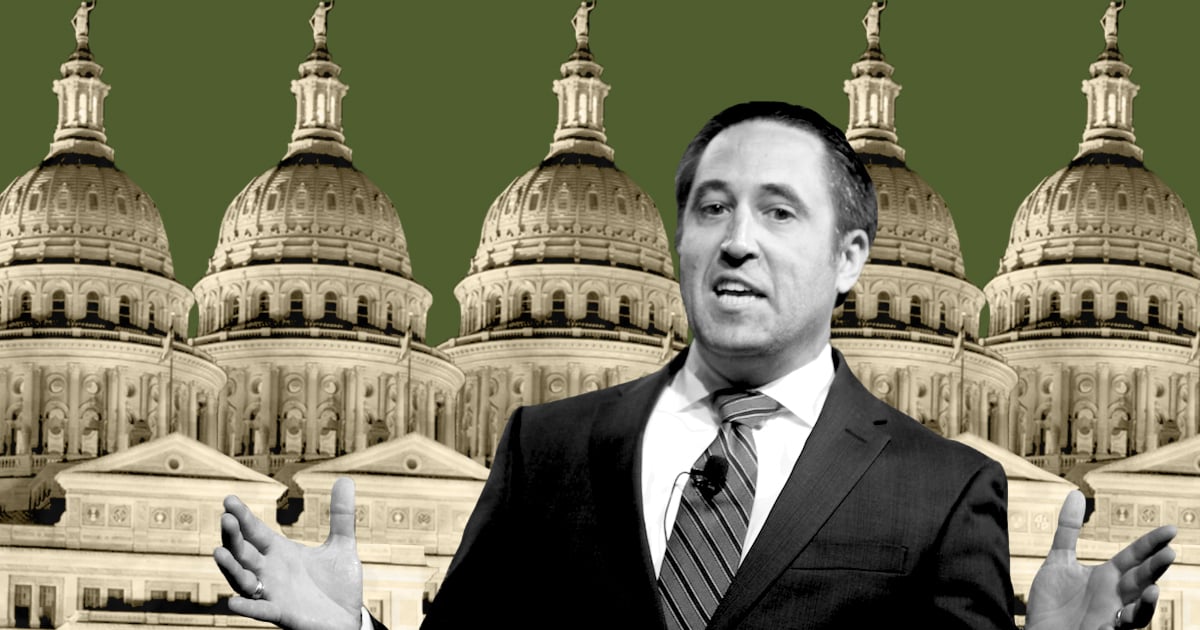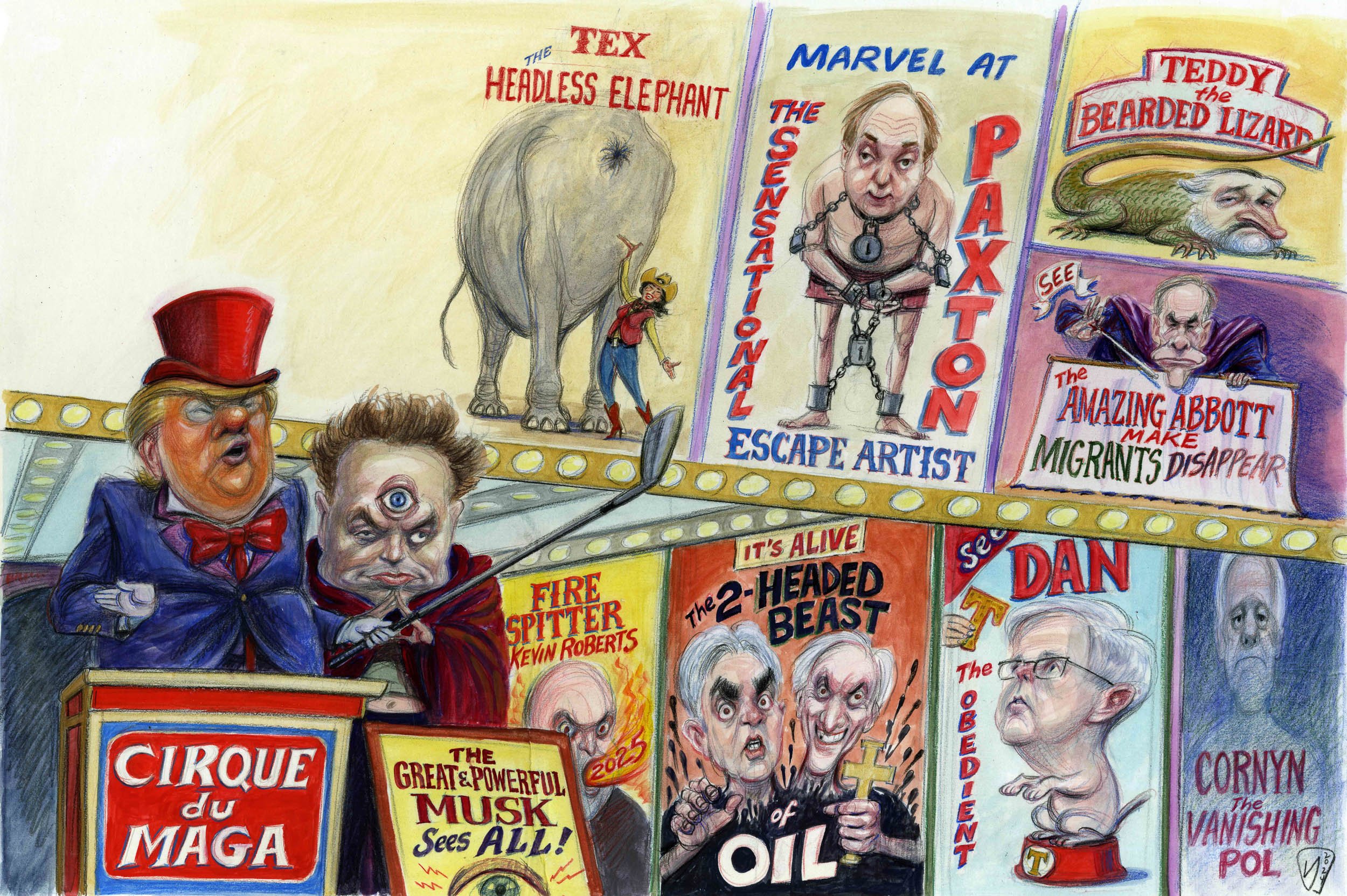Andrew Wheat
Powerball
Serendipity is one of the more intriguing elements on the periodic table of politics. Even the canniest players-and former state Rep. Ron Wilson is one-cannot unfailingly predict how minor political moves will pan out years in the future. During the 2003 legislative session, for example, Rep. Will Hartnett, a Dallas Republican, tried to amend an ethics bill by requiring legislative parliamentarians to disclose their personal finances. This was hardly a trivial matter for legislators. When hand-to-hand combat breaks out on the House or Senate floor, parliamentary interpretations of rules can save or vanquish political agendas. Wilson-a flashy Houston Democrat known for using his mastery of legislative rules to promote an iconoclastic agenda-successfully argued that House rules prohibited Hartnett’s amendment from being considered. The finances of parliamentarians would remain private.
During this year’s session, when embattled Speaker Tom Craddick faced a mutiny and his parliamentarians abruptly resigned, he picked Wilson as one of two temporary replacements. Suddenly the man whose parliamentary maneuvers helped keep the personal finances of parliamentarians secret was himself a parliamentarian.

Had Hartnett’s amendment passed, political junkies and Texas voters might have had a glimpse into the little-explored universe of Wilson’s own finances. Capitol insiders knew that GTECH Holdings Corp., the contractor that has operated the Texas Lottery since Wilson helped create it in 1991, has been one of the top clients of Wilson’s post-legislative legal practice. While Wilson says he temporarily stopped representing GTECH while serving as assistant parliamentarian, Craddick opponents say GTECH jeopardized its standing with some House members when it granted its attorney a hiatus to help establish the speaker’s “absolute” rule over the House.
“I think it’s a conflict,” says Houston Democratic Rep. Garnet Coleman. “To say that someone could have an outside income and have this kind of official role isn’t right. There’s too much moving back and forth-blurring the lines between the public and private sector. I don’t think people can tell the difference-not the way these people are running it.”
By putting Wilson right back on retainer after he shored up Craddick’s rule, the lottery company took a gamble that could turn on whether Craddick holds onto power. Communications between Wilson and the Texas Lottery Commission-which the Observer obtained under the Texas Public Information Act-reveal that GTECH and Wilson recently explored other risky steps to ingratiate the lottery contractor with top state leaders.
Although GTECH’s contract prohibits it from making direct or indirect gifts to state officials, Wilson got the Lottery Commission and Office of the Attorney General to agree to let GTECH pay Mary Wilson of the Supremes to perform at the gubernatorial inaugural in January. After securing regulatory approval for this legally slippery gift, the company opted not to go through with it. But the incident underscores Wilson’s cozy relationship with GTECH since the abrupt 2004 end of his legislative career.
Wilson came to the House in the early 1970s after serving as an aide to Mickey Leland. With a penchant for fine clothes and fast cars, Wilson was best known for selling his colleagues on the lottery. The downfall of his quarter-century legislative career was the 2002 Republican takeover of the House. Far from resisting the new GOP leadership, Wilson embraced it. As Craddick’s powerful House Ways and Means Committee chair in 2003, Wilson pushed a bill to induct the Texas Lottery into Powerball-a multistate lottery game with a massive purse. The Lamborghini-driving legislator finally had overreached. His Powerball bill crapped out, and Wilson’s constituents used the 2004 Democratic primary to elect challenger Alma Allen-who pledged to serve the district rather than Craddick.
Wilson resigned in August 2004, six months before his term ended. Two months later, Lottery Commission records reveal, Wilson sent an e-mail to commission Governmental Affairs Director Nelda Trevino. “I am enjoying semi-anonymity,” the flamboyant ex-lawmaker wrote. “My entire adult life has been spent in some type of public service. It is nice to be out of the bubble.” In a sign that he might not remain outside the bubble long, Wilson added that he had moved to Austin and would like to get together with the commission’s top staff lobbyist. “It looks like I’ll be doing some lobby work,” Wilson’s message to Trevino concludes, “so I’ll still be around the process.” Though Wilson never registered as a lobbyist, he did get back in “the process.” He told then-Lottery Commission Executive Director Reagan Greer in April 2005 that he had been hired as a lawyer by GTECH. (Greer resigned under fire three months later for approving misleading ads about Texas Lottery jackpots.)
Commission records suggest that Wilson’s main job has been contesting penalties that the commission has imposed on GTECH for allegedly not meeting the terms of its contract. A month before learning that GTECH had hired Wilson, for example, the commission deducted $750,000 from a GTECH invoice to penalize the company for a computer glitch that erroneously listed 13 winning lottery tickets as duds. Once on GTECH’s retainer, Wilson made numerous formal and informal efforts to get the agency to reverse or lower such sanctions. He filed exhaustive Public Information Act requests for commission documents about sanctions and the agency’s negotiation of its current GTECH contract. As a result, a request for recent agency documents mentioning Wilson produced 5,364 pages of stuff-even though the agency withheld voluminous materials it claimed are exempt from disclosure.
Wilson’s name also surfaced at the Lottery Commission late last year in conjunction with two ethics issues involving pop music. In a trivial one, Trevino wrote Wilson last October that agency rules prevented her from keeping a recording that he had given her of himself playing bass with other members of the David Spann Band.
The rocking attorney triggered louder ethical alarms in December, when he asked the commission if GTECH could foot the bill for Mary Wilson to perform at the inaugural bash for Gov. Rick Perry and Lt. Gov. David Dewhurst. GTECH’s contract expressly prohibits the company from making direct or indirect gifts, loans, or political contributions to Texas officials. There is a history to this prohibition. Ex-GTECH marketing director J. David Smith was convicted in 1996 of fraud, bribery, and money-laundering connected to kickbacks from a lobby scheme to persuade New Jersey to expand its gambling operations. GTECH later paid $300,000 to settle Lawrence Littwin’s unrelated claims that the Texas Lottery Commission fired him as its executive director in 1997 because he was investigating possible illegal political contributions by GTECH in Texas.
David Mattax of the attorney general’s office informed Wilson just before Christmas last year that he had consulted with the Lottery Commission and “determined that a contribution to the [governor’s] inaugural committee could be construed as an indirect contribution and therefore the Lottery Commission advises caution.” Nonetheless, Wilson and GTECH soon convinced these accommodating state agencies that GTECH could dodge the political-gift prohibition simply by paying Mary Wilson directly-rather than through the inaugural committee. Given that Lottery Commission rules prohibited Trevino from taking a compact disc from GTECH’s attorney, it is stunning that state attorneys stretched the rules enough to allow GTECH to pay a Motown queen to perform at Perry’s inauguration. A week before the inauguration, Mattax wrote Wilson that the attorney general would defer to the Lottery Commission’s interpretation of the GTECH contract. He added that “the agency’s position is that the direct payment [of Mary Wilson] would not fall within the scope of the operative contract provision prohibiting a gift, loan, or political contribution.”
Ramon Rivera, who heads GTECH’s Texas operations, immediately sought confirmation that such a payment would not violate the contract. Lottery Commission General Counsel Kim Kiplin replied on January 10 that “the agency’s position is that a direct payment by GTECH to the music group Mary Wilson and the Supremes in connection with the group providing entertainment at the inaugural festivities would not fall within the scope of the operative contract.”
In the end, GTECH decided not to bankroll Mary Wilson’s performance. A governor’s spokesperson said Mary Wilson was paid approximately $25,000 by the inaugural committee, which was funded by corporations other than GTECH. GTECH’s Rivera told the Observer that the company did not finance Mary Wilson’s performance in any way. Asked why the company abandoned such plans, Rivera said, “We’re prohibited from doing anything that would give even the appearance of a political contribution.” Ron Wilson declined to comment about either the Mary Wilson negotiations or his House parliamentary stint.
It is significant that at the last minute, GTECH abandoned its plans to make such a legally dubious expenditure after state regulators approved the scheme. Under the Lottery Commission’s narrow interpretation of the gift prohibition, GTECH apparently could make unlimited expenditures on a state official’s wedding or anniversary party, for example, provided that the lottery contractor paid the hotel, the clothing designer, and the caterer directly. Lottery Commission spokesman Bobby Heith said that General Counsel Kiplin was on vacation and that he could not comment on her interpretation of GTECH’s contract.
The day after the ex-Supreme performed at the inaugural ball, Ron Wilson drove her to the Capitol in a black Hummer. There, Mary Wilson endorsed a bill to force knockoff groups that imitate bands such as the Supremes to advertise that they’re not the genuine article. To promote the bill, Mary Wilson offered up herself for photo ops with lawmakers-including Craddick.
The legislative session that began with Mary Wilson strutting her stuff ended with another flamboyant Wilson cracking the whip. In a news flash at 10:43 on the night of Friday, May 25, Trevino e-mailed other agency staff that Craddick’s rule was up for grabs. “Understand Denise Davis, the parliamentairan [sic] just resigned and that Ron Wilson is about to [sic] appointed to this position by Craddick. Lots of speculation that Craddick will be unseated this evening.” On the following Monday, GTECH’s Rivera wrote agency Deputy Executive Director Gary Grief, “Ron Wilson called me Friday PM to temporarily resign as our legal counsel so that he could accept position as Assistant Parliamentarian.”
Soon afterward Wilson helped Craddick assert “absolute” House rule to survive the last hours of the session, then he went back on GTECH’s retainer. Clearly Craddick owes an enormous debt to GTECH’s legal temp service. Yet this loan of Wilson’s legal services didn’t endear the lottery contractor to the many House members whose efforts to put Craddick’s leadership to a vote were beaten back by the speaker-and his handpicked parliamentarians.
Award-winning Observer columnist Andrew Wheat is research director of Texans for Public Justice.


